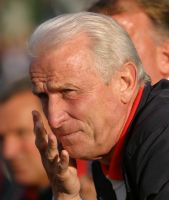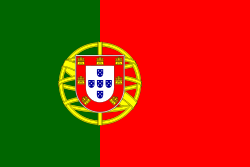Giovanni Trapattoni
| Giovanni Trapattoni | ||
 |
||
| Personal information | ||
|---|---|---|
| Date of birth | March 17, 1939 | |
| Place of birth | Cusano Milanino, Italy | |
| Playing position | Defender | |
| Club information | ||
| Current club | Republic of Ireland (manager) | |
| Senior clubs1 | ||
| Years | Club | App (Gls)* |
| 1959–1971 1971–1972 |
AC Milan Varese Total |
274 (3)[1] 10 (0)[2] 284 (3) |
| National team | ||
| 1960–1964 | Italy | 17 (1)[1] |
| Teams managed | ||
| 1974 1976 1976–1986 1986–1991 1991–1994 1994–1995 1995–1996 1996–1998 1998–2000 2000–2004 2004–2005 2005–2006 2006–2008 2008– |
AC Milan AC Milan Juventus Internazionale Juventus FC Bayern Munich Cagliari FC Bayern Munich Fiorentina Italy SL Benfica VfB Stuttgart Red Bull Salzburg Republic of Ireland |
|
|
1 Senior club appearances and goals |
||
Giovanni Trapattoni (born March 17, 1939 in Cusano Milanino, province of Milan) is an Italian football coach, considered the most successful club coach in the history of Italy,[3] and former player. He is the manager of the Republic of Ireland national team, also having coached Italy. He is also the only manager to have won all UEFA club competitions and the Intercontinental Cup. He achieved this with Juventus over his two spells with the club.
Contents |
Player
Trapattoni had a successful career as a player with A.C. Milan in the 1960s and early 1970s. Playing primarily as a defender and defensive midfielder, with the main task of passing the ball to more creative players such as Giovanni Lodetti and Gianni Rivera, he also played for the Italian team, mostly as centre back with notable marking skills. After taking a break from the Italian giants, he thought he could settle with a mid-table team for one last season instead of being at one club all his life, subsequently moving to Varese and, after a successful season with them, retired from professional football and took a job as a manager two years later.
Coach
Trapattoni began coaching at A.C. Milan as a youth team coach before becoming caretaker coach. He was appointed first team coach in 1975. In 1976, he moved on to Italian giants Juventus F.C., where he won all UEFA club competitions (European record) and, ten years later, in 1986, went to Inter Milan, being very successful with both sides. He returned to Juventus in 1991 before taking his first job outside Italy, as coach of FC Bayern Munich in 1994, and then from 1996 to 1998. He is well remembered by German fans for an emotional outburst in broken German during a press conference on 10 March 1998 ("Was erlauben Strunz?"..."Ich habe fertig!" − roughly How dare Strunz? … I have got finished) where he criticized the team's attitude ("Diese Spieler waren schwach wie eine Flasche leer!" − roughly Those players were weak like a bottle empty)[4][5](in the Neapolitan dialect of the Italian language Strunz means stronzo or jerk, and these interjections were very diffused in Italy in those years). He also coached Cagliari (1995) and Fiorentina (1998 to 2000, leading them to a UEFA Champions League place).
In July 2000 Trapattoni took charge of the Italian national team after the resignation of Dino Zoff. He led the team to the 2002 FIFA World Cup. In that tournament, after winning its first match against Ecuador, Italy's form dropped and they controversially lost to Croatia. They almost lost to Mexico, with Alessandro Del Piero scoring a late equalizer. In the second round, Italy lost to South Korea, in a game that is remembered as being one of the biggest and most controversial upsets in FIFA World Cup history, due to the arbitration by Byron Moreno.
At the 2004 European Championship, Italy once again failed to impress, playing with poor defensive tactics. They drew with both Denmark and Sweden, leading to an unexpected early exit. Somewhat controversially, Sweden and Denmark drew 2-2 in their final group game, both teams knowing that a high scoring draw would eliminate Italy no matter what score the Italians achieved in their final game against Bulgaria. On 25 June 2004, Marcello Lippi was named as Trapattoni's replacement, as his contract ran out on 15 July 2004.
On 5 July,2004 Trapattoni was named as new coach of Lisbon club SL Benfica, which he led to win the Portuguese league for the first time in eleven years, and also to the cup final (which Benfica lost to Vitória F.C.). He resigned after the 2005 season, saying he wanted to be closer to his family (in the north of Italy) but returned to management in the German Bundesliga in the summer of 2005, by signing at VfB Stuttgart, with much hype about his appointment. However, during his 20 games at the helm, VfB produced poor results. Denmark international forwards Jon Dahl Tomasson and Jesper Grønkjær openly criticized their coach, claiming he was afraid to attack. Trapattoni responded by dropping both players to the bench. With the atmosphere in the team worsening, he was sacked after just seven months, on 9 February 2006, reportedly for "not fulfilling the ambitions of the club". He was replaced as manager by Armin Veh.
In May 2006, FC Red Bull Salzburg announced it had signed Trapattoni as its new director of football, along with one of his former players, Lothar Matthäus, as coach. Trapattoni initially cast doubt on this report, claiming he had not signed any contract. But three days later, both he and Matthäus signed and made their hirings official. After their successful season of 2006/07, the club's board of directors unanimously decided to dismiss Matthäus, making Thorsten Fink Trapattoni's new assistant.
Over a club career spanning three decades, Trapattoni won ten league titles, a European Cup, a Cup Winners' Cup, three UEFA Cups, the Super Cup and four national cups (including two Italian Cups).
On 11 February 2008, Trapattoni "agreed in principle" to take over the Irish manager's job,[6]but finished the season with Red Bull before taking up the Irish position on 1 May. Former Ireland midfielder Liam Brady was expected to be part of the Italian's backroom staff,[7]while Marco Tardelli was confirmed as Trapattoni's assistant manager.[8] Trapattoni signed Brady back in 1980 for Juventus from Arsenal for just over £500,000.
Red Bull Salzburg confirmed, on 13 February 2008, that at the end of their 2007/2008 season, Trapattoni would be leaving the club to take over as the Republic of Ireland manager.[9]
Trapattoni's first game in charge, a friendly against Serbia on May 24, 2008, ended in a 1-1 draw. His second, another friendly, against Colombia five days later, meant his first victory with the national side, 1-0. This was followed by a 1-1 draw with Norway, his first competitive win against Georgia and a draw with Montengro in the World Cup Qualifying Round Group Stage. The first defeat came in a friendly against Poland on November 19 2008. The team lost by three goals to two at Croke Park.
Honours
One of the most celebrated managers in Football history, Trapattoni is the most successful manager in European competitions for clubs history with 7 titles in 8 finals, including the Intercontinental Cup final (mainly with Juventus F.C.).[10] Alongside the German Udo Lattek he is the only coach to have won all three major European club titles. Also, he is the only one to have won all UEFA club competitions and the World Club title (all with the Old Lady), also having the record of UEFA Cup wins (3).
Player
 AC Milan
AC Milan
- Serie A: 1962, 1968
- Coppa Italia: 1967
- European Cup: 1963, 1969
- Cup Winners' Cup: 1968
- Intercontinental Cup: 1969
Manager
 AC Milan
AC Milan
- Coppa Italia:
- Runner-up: 1974–75
- Coppa Italia:
 Juventus
Juventus
- Serie A: 1977, 1978, 1981, 1982, 1984, 1986
- Runners-up: 1980, 1983, 1992, 1994
- Coppa Italia: 1979, 1983
- Runners-up: 1992
- European Cup: 1985
- Runners-up: 1983
- Cup Winners' Cup: 1984
- UEFA Cup : 1977, 1993
- European Super Cup: 1984
- Intercontinental Cup: 1985
- Serie A: 1977, 1978, 1981, 1982, 1984, 1986
 Internazionale
Internazionale
 FC Bayern Munich
FC Bayern Munich
- Bundesliga: 1996–97
- Runners-up: 1997–98
- German Cup: 1997–98
- Bundesliga: 1996–97
 AC Fiorentina
AC Fiorentina
- Coppa Italia
- Runners-up: 1998–99
- Coppa Italia
 SL Benfica
SL Benfica
- SuperLiga: 2004–05
- Taça de Portugal
- Runners-up: 2004–05.
 FC Red Bull Salzburg
FC Red Bull Salzburg
- T-Mobile Bundesliga: 2006–07
Statistics
Manager
| Team | Nat | From | To | Record | ||||
|---|---|---|---|---|---|---|---|---|
| G | W | L | D | Win % | ||||
| AC Milan | 1974 | 1974 | ||||||
| AC Milan | 1976 | 1976 | ||||||
| Juventus | 1976 | 1986 | ||||||
| Internazionale | 1986 | 1991 | ||||||
| Juventus | 1991 | 1994 | ||||||
| Bayern Munich | 1994 | 1995 | ||||||
| Cagliari | 1995 | 1996 | ||||||
| Bayern Munich | 1996 | 1998 | ||||||
| Fiorentina | 1998 | 2000 | ||||||
| Italy | 2000 | 2004 | ||||||
| Benfica | 2004 | 2005 | ||||||
| Stuttgart | 2005 | 2006 | ||||||
| Red Bull Salzburg | May 2006 | April 2008 | ||||||
| Republic of Ireland | May 2008 | Present | 7 | 3 | 1 | 3 | 42.86 | |
See also
- List of UEFA club competition winning managers
- List of European Cup and Champions League winning managers
- List of UEFA Cup Winners' Cup winning managers
- List of UEFA Cup winning managers
- List of UEFA Super Cup winning managers
References
- ↑ 1.0 1.1 ACMilan.com
- ↑ FIGC.it
- ↑ "Trapattoni wants Italy deal", BBC (2004-03-30). Retrieved on 2008-10-15.
- ↑ Short version of press conference (English subtitles)
- ↑ Long version (in German)
- ↑ Trapattoni set to get Ireland job
- ↑ Trapattoni named Republic manager
- ↑ Tardelli to be Republic assistant
- ↑ Red Bull Salzburg announcement; Trapattoni leaving club at end of 2007/08
- ↑ European Cups - performances by coach - www.rsssf.com
External links
|
|||||||||||||||||||||||||||||||||||||||||||||||||||||||||||||||||||||||||||||||||||||||||||||||||||||||||||||||||
| Persondata | |
|---|---|
| NAME | Trapattoni, Giovanni |
| ALTERNATIVE NAMES | |
| SHORT DESCRIPTION | Football manager |
| DATE OF BIRTH | 1939-03-17 |
| PLACE OF BIRTH | Province of Milan |
| DATE OF DEATH | |
| PLACE OF DEATH | |